Inhibitory Effect on -Glucosidase by Traditional Thai Medicinal Plants
Main Article Content
Abstract
a -glucosidase inhibitors are utilized in the treatment of type II diabetes mellitus (DM). The inhibition of intestinal a -glucosidase would delay the digestion and absorption of carbohydrates and consequently suppress postprandial hyperglycemia. Thai medicinal plants are widely used in the treatment of diabetes mellitus. An attempt to verify their Inhibitory effect on a-glucosidase from two different sources are reported herein. Among of them, the methanolic extract of Amomum xanthioides showed significant inhibitory activity against a-glucosidase, the sucrase and maltase from rat intestine with IC50 value 3.10 4.20 and a glucosidase from baker's yeast with IC50 values of 26.6 which is 25 times greater than the standard anti diabetic drug, acarbose. The preliminary observation provides the basis for further examination of Thai medicinal plants as supplement food and DM drug toward the treatment and prevention of diabetes.
Keywords: a-Glucosidase inhibitor, Traditional Thai Medicinal Plant, non-communicable disease, hyperglycemia, Diabates Melitus, Amomum xanthioides
*Corresponding author: E-mail: rwimon@aru.ac.th
Article Details
Copyright Transfer Statement
The copyright of this article is transferred to Current Applied Science and Technology journal with effect if and when the article is accepted for publication. The copyright transfer covers the exclusive right to reproduce and distribute the article, including reprints, translations, photographic reproductions, electronic form (offline, online) or any other reproductions of similar nature.
The author warrants that this contribution is original and that he/she has full power to make this grant. The author signs for and accepts responsibility for releasing this material on behalf of any and all co-authors.
Here is the link for download: Copyright transfer form.pdf
References
[2] Chiasson, J.L., Josse, R.G., Gomis, R., Hanefeld, M., Karasik, A., and Laakso, M. 2002. Acarbose for prevention of type 2 diabetes mellitus: The STOP-NIDDM randomised trial. Lancet, 359, 207-2077.
[3] Jong-Anurakkun, N., Bhandari, M.R., and Kawabata, J. 2007. alpha glucosidase inhibitors from Devil tree ( Alstonia scholaris). Food Chemistry, 103, 1319-1323.
[4] Hung, H.Y., Qian, K., Morris-Natschke, S.L., Hsu, C.S., and Lee, K.H. 2012. Recent discovery of plant-derived anti-diabetic natural products. Natural Product Reports, 29, 580-606.
[5] Gao, H., Huang, Y.N., Xu, P.Y., and Kawabata, J. 2007. Inhibitory effect on alpha glucosidase by the friuts of Terminalia chebula Retz. Food Chemistry, 105, 628-634.
[6] Van de Laar, F.A., Lucassen, R.P., Akkermans, R.P., Van de Lisdonk, E.H., Rutten, G.E., and Van. de Weel, C. 2005. Alpha-glucosidase inhibitors for patients with type 2 diabates: result from a Cochrane systematic review and meta-analysis, Diab. Care, 28, 154-163.
[7] Phuwapraisirisan, P., Puksasook, T., Jong-aramruang, J., and Kokpol, U. 2008. Phenylethyl cinnamides: A new series of a-glucosidase inhibitors from the leaves of Angle marmelos, Bioorganic & Medicinal Chemistry Letters,18, 4956-4958.
[8] Wikul A., Damsud T., Kataoka. K., and Phuwapraisirisan P. 2012. (+)-Pinoresinol is a putative hypoglycemic agent in defatted sesame (Sesamum indicum) seeds though inhibiting -glucosidase. Bioorganic & Medicinal Chemistry Letters, 22, 5215-5217
[9] Worawalai, W., Wacharasindhu, S., and Phuwapraisirisan, P. 2012. Synthesis of new N-substituted aminoquercitols from naturally available (+)-proto-quercitol and their -glucosidase inhibitory activity. Medicinal Chemistry Communications, 3, 1466-1470.


